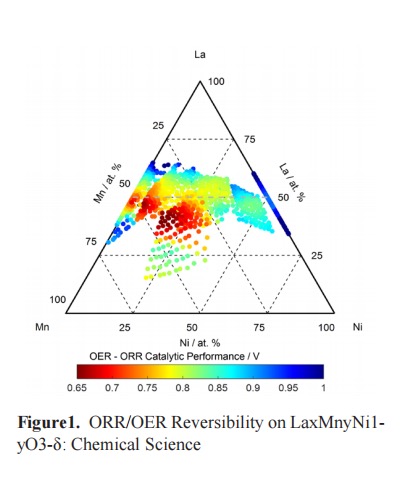EXTENDED ABSTRACT: Combinatorial synthesis and high-throughput screening methods for the discovery and optimization of solid-state materials and catalysts have their routes in the pharmaceutical industry, but were slower to develop for solid-state systems because of the difficulties of reliably synthesizing such materials, and the challenges in developing fast and reliable screening methods. There have been several approaches taken centred on combinatorial thin film synthesis of materials, however a step change in the development of new functional materials both commercially and academically has taken place with the introduction of combinatorial evaporative PVD (ePVD) synthesis. The advantages of this synthetic approach, which provides a low kinetic barrier to compound formation, the direct synthesis of amorphous materials and of complex ion compounds, the control of elemental components (including lithium), and the synthesis of supported nano-particles will be emphasized. Strategies for “on-chip” screening, materials characterization and integrated informatics incorporating machine learning with the goal of understanding the function/composition/structure relationship will be exemplified. Results will be presented from programs to develop complex oxides for reversible oxygen (ORR/OER) electrocatalysts for fuel cells (Figure 1), high frequency tunable dielectrics for advanced capacitors and solid-state electrolytes for solid state Li+ ion batteries. Examples will also be presented in the development of chalcogenide and metal alloys as functional plasmonic materials for advanced optical devices for communication, memory and logic, and on 2-D chalcogenides.

Keywords: Combinatorial Science, Fuel Cell Catalysts, Batteries, Plasmonic Materials, 2D materials.

Brian Hayden obtained his PhD in Bristol in 1979 and was a postdoctoral fellow at the Fritz Haber Institute of the Max Planck Society, Berlin. He was appointed a Personal Chair at the University of Southampton in 1995. In 2000, he extended thin film MBE based methodologies to the combinatorial synthesis and screening of solid-state materials and catalysts. He founded Ilika plc in 2004, a company involved in materials discovery in the electronics and energy sectors. He founded the Advanced Composite Materials Laboratory at the University of Southampton, extending materials development into new areas of application including fuel cells, solid state lithium ion batteries, phase change and resistive memory, thermoelectrics, photonic materials, phosphors, and tunable dielectric materials. He is author of over 160 refereed papers {h-index 46} and over 30 active patents. He is a Fellow of the Royal Society and the Institute of Physics.